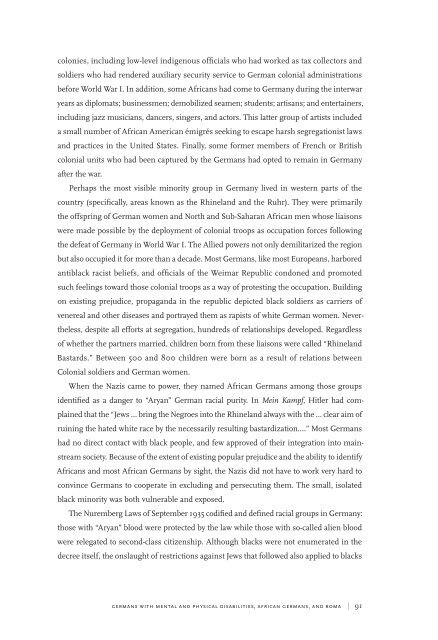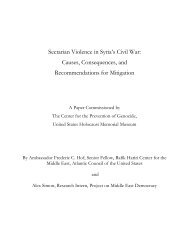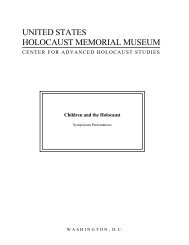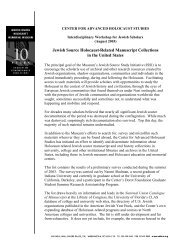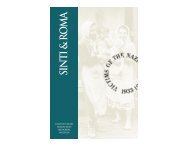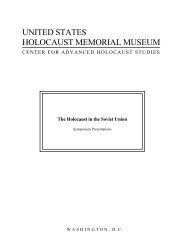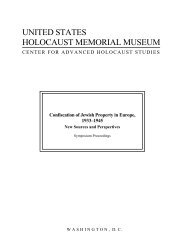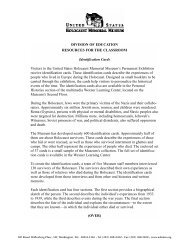the quest for racial purity - United States Holocaust Memorial Museum
the quest for racial purity - United States Holocaust Memorial Museum
the quest for racial purity - United States Holocaust Memorial Museum
Create successful ePaper yourself
Turn your PDF publications into a flip-book with our unique Google optimized e-Paper software.
colonies, including low-level indigenous officials who had worked as tax collectors and<br />
soldiers who had rendered auxiliary security service to German colonial administrations<br />
be<strong>for</strong>e World War I. In addition, some Africans had come to Germany during <strong>the</strong> interwar<br />
years as diplomats; businessmen; demobilized seamen; students; artisans; and entertainers,<br />
including jazz musicians, dancers, singers, and actors. This latter group of artists included<br />
a small number of African American émigrés seeking to escape harsh segregationist laws<br />
and practices in <strong>the</strong> <strong>United</strong> <strong>States</strong>. Finally, some <strong>for</strong>mer members of French or British<br />
colonial units who had been captured by <strong>the</strong> Germans had opted to remain in Germany<br />
after <strong>the</strong> war.<br />
Perhaps <strong>the</strong> most visible minority group in Germany lived in western parts of <strong>the</strong><br />
country (specifically, areas known as <strong>the</strong> Rhineland and <strong>the</strong> Ruhr). They were primarily<br />
<strong>the</strong> offspring of German women and North and Sub-Saharan African men whose liaisons<br />
were made possible by <strong>the</strong> deployment of colonial troops as occupation <strong>for</strong>ces following<br />
<strong>the</strong> defeat of Germany in World War I. The Allied powers not only demilitarized <strong>the</strong> region<br />
but also occupied it <strong>for</strong> more than a decade. Most Germans, like most Europeans, harbored<br />
antiblack racist beliefs, and officials of <strong>the</strong> Weimar Republic condoned and promoted<br />
such feelings toward those colonial troops as a way of protesting <strong>the</strong> occupation. Building<br />
on existing prejudice, propaganda in <strong>the</strong> republic depicted black soldiers as carriers of<br />
venereal and o<strong>the</strong>r diseases and portrayed <strong>the</strong>m as rapists of white German women. Never<strong>the</strong>less,<br />
despite all ef<strong>for</strong>ts at segregation, hundreds of relationships developed. Regardless<br />
of whe<strong>the</strong>r <strong>the</strong> partners married, children born from <strong>the</strong>se liaisons were called “Rhineland<br />
Bastards.” Between 500 and 800 children were born as a result of relations between<br />
Colonial soldiers and German women.<br />
When <strong>the</strong> Nazis came to power, <strong>the</strong>y named African Germans among those groups<br />
identified as a danger to “Aryan” German <strong>racial</strong> <strong>purity</strong>. In Mein Kampf, Hitler had complained<br />
that <strong>the</strong> “Jews … bring <strong>the</strong> Negroes into <strong>the</strong> Rhineland always with <strong>the</strong> … clear aim of<br />
ruining <strong>the</strong> hated white race by <strong>the</strong> necessarily resulting bastardization.…” Most Germans<br />
had no direct contact with black people, and few approved of <strong>the</strong>ir integration into mainstream<br />
society. Because of <strong>the</strong> extent of existing popular prejudice and <strong>the</strong> ability to identify<br />
Africans and most African Germans by sight, <strong>the</strong> Nazis did not have to work very hard to<br />
convince Germans to cooperate in excluding and persecuting <strong>the</strong>m. The small, isolated<br />
black minority was both vulnerable and exposed.<br />
The Nuremberg Laws of September 1935 codified and defined <strong>racial</strong> groups in Germany:<br />
those with “Aryan” blood were protected by <strong>the</strong> law while those with so-called alien blood<br />
were relegated to second-class citizenship. Although blacks were not enumerated in <strong>the</strong><br />
decree itself, <strong>the</strong> onslaught of restrictions against Jews that followed also applied to blacks<br />
germans with mental and physical disabilities, african germans, and roma | 91


